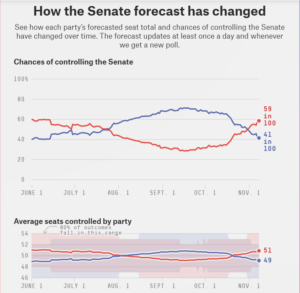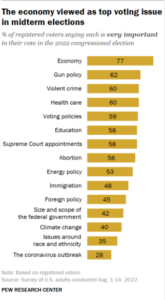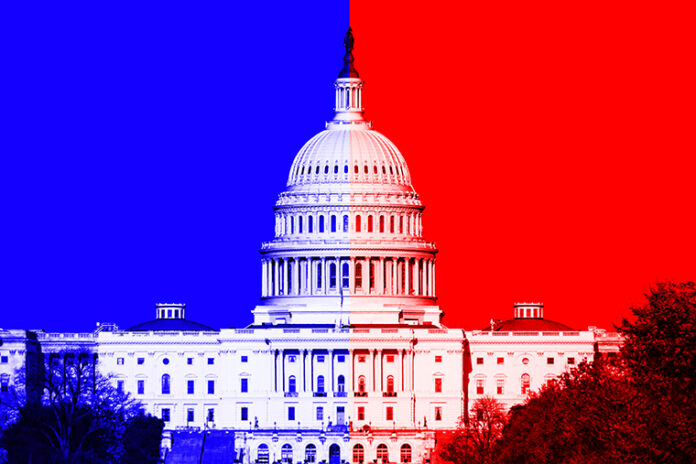On November 8, 2022, millions of voters across the country casted their ballots. These voters’ ballots decided the political balance in our government, including the US Senate. On election night, 35 out of 50 incumbent senators were up for reelection. Prior to the election, many political scientists and experts predicted that Republicans would secure both the Senate and House of Representatives. A massive red wave was believed to have occurred. However, these forecasts did not fully come into fruition as Democrats maintained their Senate control and even flipped a seat.
ISSUES INFLUENCING SENATE RACES
After the reversal of Roe v. Wade, 15 states passed legislation that banned abortions completely or after a certain period of time. Immediately, many pro-life committees announced that the reversal was considered a moral triumph, reinforcing the divine right to life and new shift to true democracy. However, this sparked numerous controversies regarding legal uncertainty. For instance, some states’ new abortion restriction conflict with their state constitutions’ laws on privacy protection. Despite viewed as a secondary issue, many voters still believe that abortion is critical in their decision-making on election night.


Currently, in addition to high inflation for the past 40 years, gas prices have climbed rapidly to $3-4 per gallon, and sometimes $7-8 in a few states. Gasoline prices have been surging since April 2020, when the pandemic initially drove prices down and eventually up to $3-4. Internationally, the price of crude has doubled since the pandemic. With Russia’s invasion of Ukraine, the US and EU imposed severe sanctions on Moscow, which led to the sudden rise in crude oil’s prices. Finally, the initial shutting down of oil refineries thrusted a long-term effect on public transportation for many middle to lower-income families.

For the past decade, the US has struggled with domestic security issues such as the border and gun violence. In 2022, 2.76 million migrants massed and crossed into the US. During these crossings, National Guard and state police troopers discovered thousands of weapons and doses of fentanyl. In addition, the number of suicides, homicides, and school shootings steadily increased. For instance, Texas experienced 8 shootings in the past 13 years.

INITIAL FORECASTS
Prior to the election, numerous opinion polls increasingly shifted in favor of a Republican victory. As economic stability and foreign policy come into question, many experts believe that the American public will choose Republicans to control the Senate and House. According to FiveThirtyEight, Republicans have a 59% chance of winning the Senate, whether it’s winning narrowly with 51 or massively with 56 seats. Specifically, it is predicted that Republicans will flip senate seats in three states: Arizona, Nevada, and Georgia.
As for the Democrats, many thought that they would lose control of both chambers of Congress. FiveThirtyEight gave the Democrats a low 41% chance of winning. Many concluded that Democrats might even lose senate seats in Colorado and New Hampshire, historically blue-dominated states.

OVERVIEW OF BATTLEGROUND CONTENTIONS
The Republicans dominated their holdings in the Midwest and Deep South by securing 55%+ of the votes. However, three pivotal races came in close contention for the GOP: Wisconsin, North Carolina, and Ohio. Similar to the Republicans, Democrats (DNC) were able to hold on to all of their incumbent senate seats. In addition, the Democrats even gained a previous Republican senate seat, which extended their majority lead. The DNC was locked in hard-fought standoffs in three states: Arizona, Nevada, and Pennsylvania.
NARROW REPUBLICAN VICTORIES
Wisconsin
Senator Ron Johnson confronted Democrat opponent Mandela Barnes in a historic toss-up state. Serving in the Senate, Johnson serves on the Foreign Relations, Budget, Homeland Security, and Commerce Committees. In 2017, Johnson was one of the most ardent supporters of Trump’s tax reform bill and repeal of the Affordable Care Act’s individual mandate. Johnson’s seat was considered one of the most vulnerable for the GOP this election cycle.

Meanwhile, Mr. Barnes attacked Johnson for neglecting the suburban and lower-income families. However, despite receiving more funds than his Republican adversary, Barnes slipped behind Johnson in polls due to her past soft stances on crime. Eventually, Ron Johnson maintained his senate seat by securing an ample 50.5% of the votes.

North Carolina
Republican Ted Budd, Democrat Cheri Beasley, and two other independents faced off for the senate seat. Since 2021, Budd serves on the Committee of Financial Services, and is a member of organizations such as the Freedom Caucus. Strongly backed by Donald Trump and Senate Minority Leader Mitch McConnell, Budd’s fundraising far outpaced those of the other primary opponents.
Meanwhile, Cheri Beasley is considered the first Black woman to serve as North Carolina’s Supreme Court Justice. Despite Beasley’s platform focused heavily on abortion and racial equality, most NC voters based their decisions off the current economy and rising crime rates. As a result, Ted Budd retained his senate seat with a sufficient 50.7%, which was 100k votes more than his adversary.

Ohio
Republican JD Vance and Democrat Tim Ryan vied for the senate seat. In January 2022, Vance succeeded fellow Republican Rob Portman. JD Vance is an award-winning author of Hillbilly Elegy, a book that was one of the New York Times’ best sellers in 2016. As for his political views, Vance believes that abortion and illegal immigration should be halted through stricter laws. In addition, as mentioned in his book, Vance asserts that the culture war is a class war against middle-class Americans.

On the other side, Tim Ryan has been serving as a US House Representative since 2003. Since then, Ryan has attempted to maintain his moderate and independent stance. By doing this, Ryan distanced himself from President Biden and accused China of currency manipulation and outsourcing American manufacturing. Ryan’s campaign platform is centered around economic protectionism, unionization, and income equality.
However, despite desperately trying to sway independents, Ryan succumbed to Vance. In fact, Vance unexpectedly defeated Ryan by gaining over 2.1 million votes or 53.3% of the turnout.

NARROW DEMOCRAT VICTORIES
Arizona
Democrat Senator Mark Kelly and Republican venture capitalist Blake Masters were locked in close contention. This occurred at the hour when Democrats were only one seat away from the majority. Mark Kelly is a former NASA astronaut who flew to space four times. Kelly is married to former US Rep Gabby Giffords, who inspired many with her recovery from an assassination attempt in 2011. In 2020, Kelly won the AZ senate seat in a special election after Senator John McCain’s death. As for his campaign, Kelly focused on abortion rights, social security protection, and the ensuring of safe water supply from the Colorado River. Similar to JD Vance, Kelly distanced himself from Biden regarding border security.

Meanwhile, Blake Masters attempted to align Kelly with Biden’s border failure and took a hard stand against abortion. However, Masters struggled to raise funds and received numerous criticism for his position on the 2020 election results. In the end, Senator Mark Kelly kept his seat through garnering 51.4% or 1.3 million votes.

Nevada
Incumbent Senator Catherine Cortez Masto faced off against Republican challenger Adam Laxalt. In 2016, Masto became the first Latina elected to the US Senate as she replaced veteran Senator Harry Reid. A senator since 2017, Masto serves on committees regulating commerce and energy affairs. During her campaigning, Masto concentrated on transforming abortion into a major discussion point and called out Republicans for attempting to enforce a federal ban. In addition, Masto tried to remind voters that abortion and border security were still pressing issues, while portraying Laxalt as an 2020 election denier.

A Georgetown Law graduate and former judge with the US Navy, Adam Laxalt served as Attorney General of Arizona from 2015 to 2019. After his tenure, Laxalt served as co-chair of Trump’s campaign in Nevada. In 2022, Laxalt won his Republican primary. Laxalt entered the race as favored to win the seat. Even though he held a lead for election night, Senator Masto eventually pushed ahead of Laxalt, winning by a mere 9000 votes.

Pennsylvania
In October 2020, Pennsylvania Republican Senator Pat Toomey announced that he would not run for a third term. This leaves his seat vacant, which led to John Fetterman and Dr. Mehmet Oz to compete in one of the closest and most chaotic races. Since 2019, Fetterman has served as Pennsylvania’s lieutenant governor. Three years later, he announced his run for senator. As a result, Fetterman easily secured 59% of the Democratic vote. As a progressive, Fetterman’s campaign emphasizes on criminal justice reform, raising of minimum wage to $15/hour, and legalization of cannabis. In addition, Fetterman was struck with a stroke and was forced to battle it during the debate.

Battling the progressive Fetterman, Oz smoothly passes through the Republican primary. Considered the first Muslim to elected as a senate candidate, Oz described himself as a conservative Republican. Oz advocated for the end of abortion and legalizing of cannabis, supported school choice and right to bear arms, and even sided with Democrats on defending same-sex marriage.

However, John Fetterman suffered a stroke. As a result, he struggled to defend his position during the debate. For instance, Fetterman mumbled his stance on fracking, which caused many to suspect his flip-flopping. However, receiving $48 million (four times Oz’s), Fetterman invested in ads that sought to convey the current inflation, while promising higher wages and good American jobs. Fetterman’s gamble paid off as he racked up 51% of the votes, defeating Oz by nearly 5%. Through this victory, Fetterman defied the forecasts disfavoring him, especially after the debate.
SIGNIFICANCE
The political balance in the senate continues to remain in the hands of Democrats. This signifies the continuation of a Democrat-dominated senate. This senate will affect all aspects of presidential treaties and Supreme Court choices, impeachment, and US foreign policy.
After the elections, despite many polls claiming that the economy and border were top priorities, the reversal of Roe v. Wade, abortion rights, and LGBT and same-sex marriage remain important to many. According to several polls, over 50% of Americans believe that women should have the right to access abortion clinics. This also explained why Democrats were able to successfully appeal to and gain suburban votes in swing states like Nevada and Pennsylvania.

Regarding border security and the economy, Republican-dominated states featured the continued success of the GOP. The majority of people in these states believe that handling inflation, crime rates, border security, and foreign affairs (e.g. Russo-Ukrainian War, China) will be better off in Republican hands.


Finally, as for US foreign policy, a Republican House could indicate the limiting of military supplies to Ukraine. Senators like JD Vance and Mike Lee expressed skepticism of Ukrainian aid and emphasized on counter measures against China. Recently, Specifically, the GOP is seeking to strengthen military presence in Asia and reorient intelligence concentrations to counter China in the great power competition. This process of strategy intensified after heightening tensions between the warring powers over Taiwan back in August.

CONCLUSION
Prior to the critical election night, the majority of political experts and people expected a Republican red wave. This red wave was expected to have also occurred in swing and blue states. However, the Democrats managed to secure all of their swing state holdings and flipped a Republican seat. Even though the Democrats have control over the senate, the momentum might shift as the US confronts numerous economic, security, and social issues.






